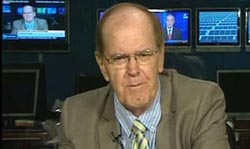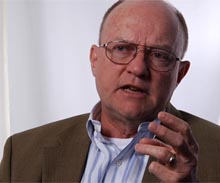The United States arrays “yesterday’s terrorist” anti-Iran Mujahedin-e Khalq Organization (MKO) and honors them as “today’s freedom fighters” to use them against the Islamic Republic, says  an analyst.
an analyst.
On September 28, the terrorist group was taken off the US State Department’s blacklist a week after US Secretary of State Hillary Clinton sent the US Congress a classified communication about the move.
The US claimed that the decision was made because the MKO has not carried out any acts of terror over the past 10 years.
Meanwhile, a September 21 New York Times article reaffirms that the support of prominent US politicians for the MKO organization has undoubtedly played a role in the de-listing of the MKO organization as a terrorist group.
The article said the long list of high-ranking US politicians supporting the MKO includes: former CIA Directors, R. James Woolsey and Porter J. Goss; former FBI director Louis J. Freeh; former US President George W. Bush’s homeland security secretary, Tom Ridge; Attorney General, Michael B. Mukasey; and President Barack Obama’s first national security adviser, Gen. James L. Jones.
Many of MKO’s American supporters, yet not all, are said to have received fees of up to 15,000 to 30,000 dollars to give speeches to the group, in addition to travel expenses to attend MKO rallies in Paris. The former Democratic governor of Pennsylvania, Edward G. Rendell, admitted in March that he had received a total of 150,000 to 160,000 dollars, the US daily article added.
Press TV has conducted an interview with Beirut-based international lawyer and director of the Americans Concerned for Middle East Peace movement, Franklin Lamb, to further shed light on the issue.
Press TV: Mr. Lamb thanks for being with us. Let’s just first look at the statement that’s being given out by the US State Department on its decision. It says that in view of the group’s public renunciation of violence, the absence of confirmed acts of terrorism for more than a decade and their cooperation in the closure of their paramilitary base in Iraq we’ve decided to delist them.
Now legally speaking at least the question is where is the issue of accountability for the crimes and the terrorist activities that the group has carried out before these years that they haven’t carried out terrorist activities according to the US?
Lamb: Yes, well let me just say that the rationale that you just iterated from the American government is frankly nonsense. These aren’t the issues.
The issue is as we saw a recall in Afghanistan, in Iraq, in Libya and now in Syria, yesterday’s terrorists can be today’s freedom fighters even if they are going to be tomorrow’s terrorists. This is a thinly, thinly disguised effort to ratchet up the pressure on Iran. I think that’s clear.
Even acknowledged sources in the US Congress what we can say is that the MEK has been I think well-tutored politically on how the American system works. Look who they’ve had endorse them: former FBI director [Louis J.] Freeh, former head of Homeland Security Tom Ridge, Howard Dean of the Democratic National Committee and five or six important members, former members of Congress.
What do these people have in common? They are out of office. They missed the government perks and they’re paid 100 thousand dollars each by the MEK to give speeches. So it’s not much for them to endorse this initiative which is aimed at opening up the American system to the MEK now based in Paris.
Count the days before their headquarters is in Washington. Count the days before the Zionist lobby joins them and funds them and the American intelligence agency supports them in order to do what?
In order to create a hopeful, viable opposition to the government of the Islamic Republic in time for next year’s election. These will be billed to the public and the world as the new Jeffersonian Democrats of the Middle East. Whatever it takes to dress them up in respectability. So that’s what we see here. Forget history. Forget terrorism. Forget who killed who on American soil that used to stand for something. We have a political agenda. We want them. We need them.
We’re going to squeeze Iran in the coming months. I think we’ll bear this out.
Press TV: You say the issue of cooperation between the MKO and the US administration. We know for one that following the fall of Saddam, there was cooperation between the US and the members of this group when they were stationed in Camp Ashraf in Iraq. So what you’re concluding is that this is a continuation of that cooperation but now legally acceptable at least for the United States.
Lamb: Absolutely, that was 30 years ago that we supported the MEK as part of our support of Saddam against Iran. That’s three decades ago. We weren’t all that interested in this group until recently we see an opportunity, another layer of sanction if you will, another way to pressure the regime, hoping that it will implode in some way. I don’t know that we have a big future with the MEK but they’re very useful instrument today.


